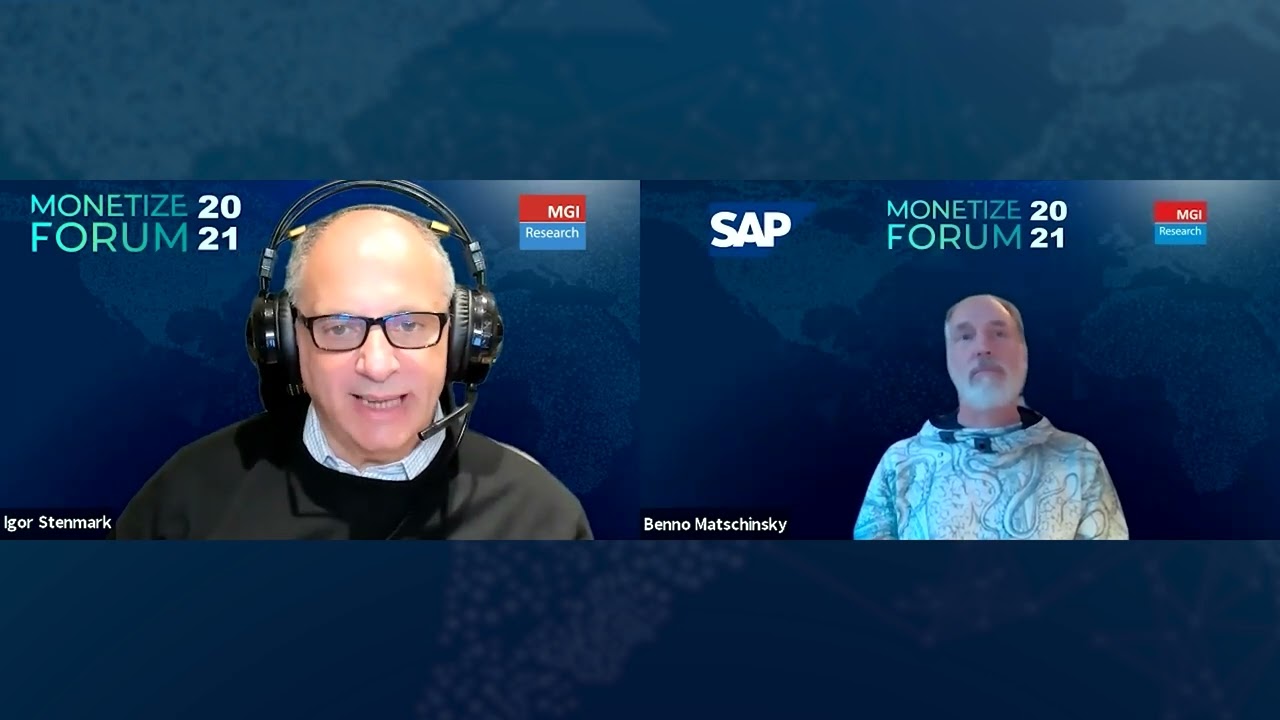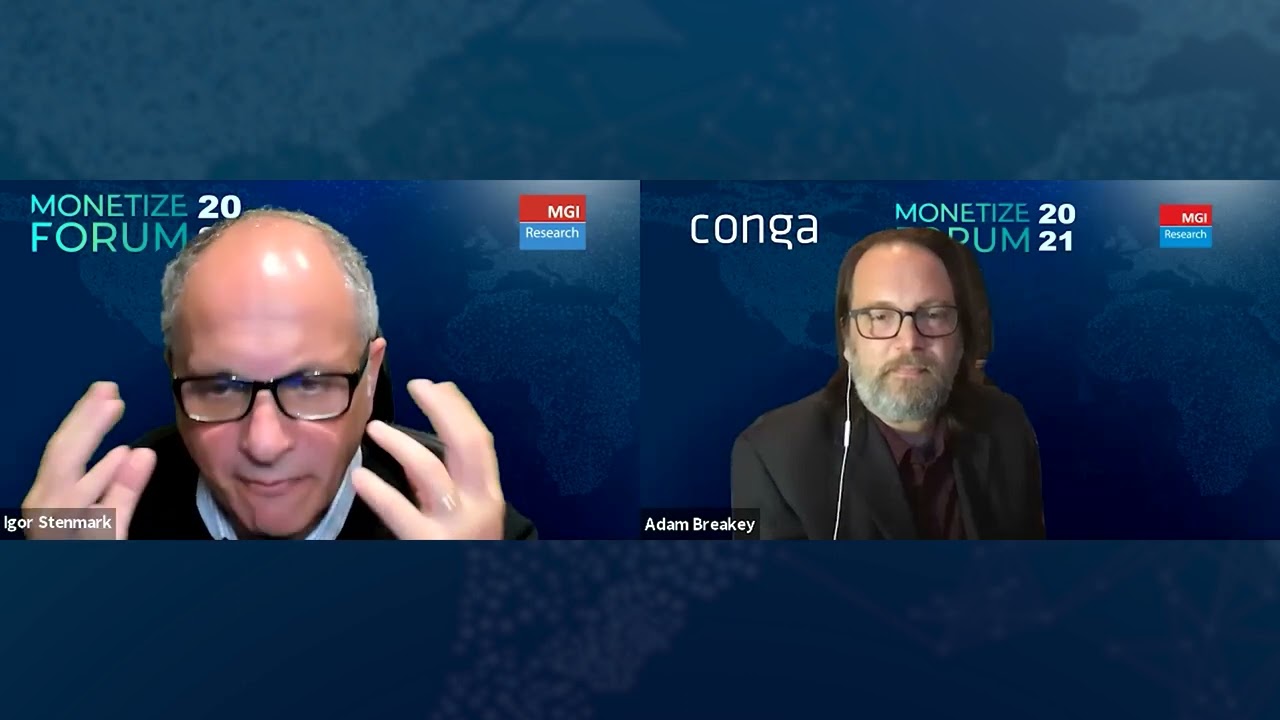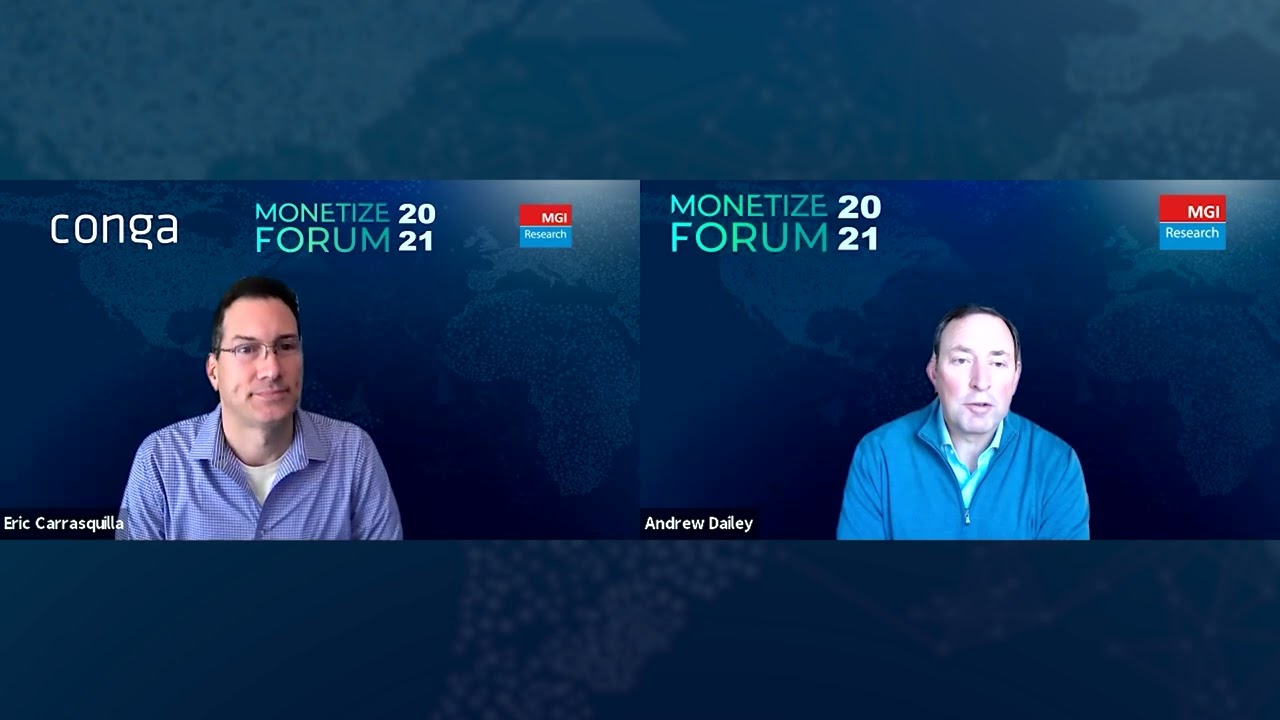In our experience helping businesses through the process of selecting solutions for a quote-to-cash operation, an otherwise promising result can come up short if the right systems integration partner isn’t brought in to tie it all together. Depending on your unique organizational needs, going with a large, global provider could be just as big a mistake as going with the cheapest, most basic option. To provide his insider perspective on strategies and challenges in selecting and working with an SI partner, we invited Tim Fraser to speak with MGI Research analyst Igor Stenmark at the 2021 Monetize Forum. Tim is the Vice President of Strategy Consulting for Quote-to-Cash at Forsys, and he shares here his experience of what works and doesn’t work in integrations, as well as how Forsys found their sweet spot in prioritizing agility, domain expertise, and real commitment to their clients.
Key Issues
What are the Forsys accelerator companies, and what part do they play in overall integration?
How should companies decide which SI partner to bring on board?
What are the best practices and pitfalls in systems integrations?
Guest Profile
Tim is the VP of Strategy for Q2C at Forsys and is responsible for strategic ISV partnerships. He joined Forsys from Tableau Software where he led the largest Salesforce CPQ Data Migration to Apttus. Prior to that, he was Sr. Director in Apttus’s professional services business. In his over 35-year technology career, he’s led companies of various sizes to adopt transformation strategies using emerging technologies to stay competitive and relevant.
Igor Stenmark
Hello, this is Igor Stenmark of MGI Research, and we are at the Monetize Forum 2021 conference. In our next session, “Quote to Cash Systems Integration: Formula for Success”, we will chat with Mr. Tim Fraser. Tim is the VP of Strategy Consulting at the quote-to-cash systems integration firm Forsys. Tim has recently joined Forsys from Tableau Software. At Tableau, Tim led one of the largest migrations of Salesforce CPQ to Apttus (now known as Conga). Prior to that, Tim was Senior Director in Apttus’s professional services business where he led IBM Global through their quote-to-cash transformation.
In his 35-plus years working in technology, Tim has tackled a broad range of challenges at companies small and large across a spectrum of disciplines and industries, so he’s a very experienced technologist. Tim, welcome to Monetize Forum 2021. It’s a pleasure to have you here.
Tim Fraser
Thank you, Igor. It’s great to be on this platform and here in this virtual setting.
Igor Stenmark
Thank you. It’s great to have you. To start, could you just give us a bit of introduction to Forsys? What’s the background and backstory? What do you guys do? What’s your focus? What’s the scale of the business?
Tim Fraser
Forsys has been running under the Forsys umbrella from 2015. The organization was founded by some very senior leaders with very deep lead-to-cash and quote-to-cash experience—over 25 years each, and, honestly, when a bunch of frustrated execs wanted to do it differently and do something that’s of value for clients, they formed the company. Forsys’s umbrella is relatively new on the scene, but the experience of the leaders is very deep and very broad on an enterprise scale. So, while the company’s been around for a while, the experience really goes much further back.
Obviously, we have strong leaders, myself and my peers, in this. We provide really deep services around lead-to-cash and quote-to-cash, but we’ve expanded our portfolio to really work on financial management and supply chain management. As we get into a little bit more about what we do, I’ll explain how we aren’t just an SI doing implementations; we’re also doing business value consulting and managed services. So, we’re really creating a very strong portfolio. We’re building what the clients are asking us for because we’re very strong in delivery and value. So, that’s the summary of us.
Igor Stenmark
Right. We know of you primarily as a specialist in integrating monetization and quote-to-cash. But I know that, besides being a competent SI player, you guys also have one of the few firms with a viable product operation where you actually turn some of that expertise into development of products. Can you talk about that aspect of the business a bit and what your strategy is in this area?
Tim Fraser
Sure. A lot of our product development has been geared toward a very practical need. In working with our clients, we see them get frustrated with the very long-tailed, risky implementations. Because our perspective allows us to see patterns in how things work with our clients, their issues may look unique to them, but in reality, they’re not one-off problems. So, we looked at where the sweet spots are for the things we can normalize, reduce, and productize. We actually call them our accelerators, and we have multiple companies that we’ve incubated.
One of them is called RISE, and they’re a B2B e-commerce platform. To get a B2B e-commerce platform up and running with a complex CPQ go-to-market strategy underneath it can take months. I worked in some very large three-letter companies where it actually took years. So, we built an out-of-the box configuration for, as an example, product development—just fit to purpose for CPQ. So, RISE bolts onto pretty much anybody’s CPQ, and it has a headless e-commerce front to that. Another example is that we’re asked to do a lot of work consolidations in Salesforce, and migrations of data are very practical things. Of course, there are lots of companies out there doing it and charging a ton of money to give you a tool. We embed that into our services because, at the end of the day, we’re going to get a product out the door faster for the client. We took a practical approach on that, and we have a product called Flodata. Flodata moves data between systems, not just for migration, but also as a SaaS-based integration platform. We have another company which is actually here at the Forum under its own umbrella. That’s Ayara, which is both revenue intelligence as well as revenue recognition. So, we have both sides of that. The key thing is that we have mature products and incubations that we are hoping we’ll not only be able to use for ourselves but also be able to offer to our clients to use directly.
Igor Stenmark
What do you think your strategy is overall? Are you going to basically continue operating as an SI umbrella and incubate some of these software businesses as opportunities come up? What’s your plan in this area?
Tim Fraser
Well, we’re all about strategic partnerships in this area. What we’ve done for ourselves to really improve what we do for our clients and bring rapid time to value to them is something some of our partners need. So, we’re forming strategic partnerships with companies like Apttus, and we’re in discussions right now with other large companies that can’t be named, but they’re looking at white labeling some of what we do so that they can enhance their portfolio because we’re very clearly filling solutions in the quote-to-cash arena and even in revenue recognition and billing life cycles. If you really look at the middle office, there are a lot of connectors. The things that we’re doing to improve the value for our clients are being looked at to enhance the core capabilities of some of the products that just don’t meet the market needs.
Igor Stenmark
Got it. I want to go back for a moment to discuss SI (systems integration) strategy. We see some of our clients spending months and months trying to select a product in a particular area as it applies to quote-to-cash—that could be CPQ, billing, or contract management. We spend four, five, six, or nine months going through a selection effort, and then they say, “Oh, we also need an integration partner,” and that takes between two days and two weeks, and, not surprisingly, there’s a high failure or dissatisfaction rate in those instances. What advice can you offer us? How do you think a company should be thinking about selection of its SI partner? What should the approach and process be?
Tim Fraser
Obviously, every company starts small and then gets their legs underneath them. Forsys has always had the domain expertise. It’s just about what we do and how we’re positioned for the market. We started out with a lot of companies approaching us to say, “Hey, we’ve got a problem. We hired a consulting company, and they can’t deliver. We need somebody to come in and bail us out.” I’m actually still actively dealing with this. Often, the profile we see is that, as much time as companies spend looking at solving their business problems, looking at the business value side of that, and looking at their integration challenges, they frequently just want to push that off to somebody else. Meanwhile, most of the integration companies come in with a very narrow focus: “This is how my box works, and you’ve got to fit inside my box.” That bridging process becomes contentious because a lot of the companies are not ready for the complexity of enterprise-scale or even for small companies that are growing to large companies with lots of these SaaS products and tools.
Our DNA has been around helping clients reconnect with their projects and fix them, and they’ve discovered that we’re very strategic in how we approach that. We’ve naturally grown into our business value consulting and strategy consulting. My advice right now is that if you just want an integrator and to ship your work out to the cheapest bidder, be careful what you search for because you will get exactly what you think (and maybe a little more), which is the wrong side of the equation. You want to look for somebody that can provide you, at the right time, unbiased opinions about a particular technology and solution in a business context.
We’re very strong in business alignment and business strategy, and we work to say, “These are the right technology fixes.” We provide you solutions that are really aligned to your technology roadmap, and if you don’t have one, we can help you with that. It’s really about the last mile of picking an implementation partner. It may look like you start with that, but in reality, you’ll do yourself a much better service to look for somebody who can provide you more of a roadmap and guidance as an advisor, that can have skin in the game—not somebody that says, “I’m an advisor. I’m going to write your paper and somebody else is going to do the implementation. That’s not my problem.” We take it end to end in our partnership with our clients. That’s our differentiator.
Igor Stenmark
What should companies expect from an SI firm? What makes relationships work, and conversely, what can put them at risk?
Tim Fraser
Honestly, it’s purely skin in the game. You can’t just have a punch list of things in a work order that has to get done and then throw bodies at it. The SI department needs to really understand your business.
90% of the time, we all have the same issues. The business wants this, and the tech wants this. Implementation fits in the middle, and we shoehorn things into that. You need a technology integration partner that really has the diversity of experience in tech and understands what integration is about.
I used to work, as you mentioned in the intro, for Tableau, one of the largest data companies around and where I did one of the largest data migrations. The classic message I got from the execs was, “What’s so hard? It’s ETL—extract, transform, load; take the data from here and throw it into that system. What’s so hard about that? We have tons of tools that do ETL.” So, why does it take so long to implement? It’s because of the extract logic, the transformation logic, and then the target, which might be something that’s a known product like a Salesforce platform, an Apttus platform in the CPQ. The hardest part is your business, knowing how your business works and extracting the data in the context of 20 years of history. How do you read that information? It’s about really drilling into the details.
We’re all about really getting to that level of detail to understand and expose. Just because somebody who’s fresh and new to the company says, “I have a requirement,” and you write it down, that’s not the requirement. You’re going to look at the data, and the data is going to tell you what the requirement is more than the business telling you the requirements. You have to balance that, discover it early, and be a partner with your client early, so you don’t start a project until you’re really ready with the quality of information that’s going forward. Even if they come in late, an SI partner really needs to step forward, challenge those upfront questions, and make sure that those are exposed before they start checking boxes on a deliverable.
Igor Stenmark
It sounds like what you guys bring to the table is domain expertise—technical, business, and best practices, as well as an advisory perspective. Additionally, you have pre-packaged relationships with software suppliers. I wanted to ask you to talk a bit more and expand on what your partnership strategy is. Who do you guys work with right now? What makes a relationship work, and what makes it something that you want to forget?
Tim Fraser
We’re Salesforce-first as a platform and as a partner. We’re a strategic partner with Salesforce in that we understand and have expertise in native Salesforce products. If you decide that you want to use Salesforce CPQ, we are a quote-to-cash domain leader, and we understand it end to end. In that, because we’re doing quote-to-cash, there’s the cash side, and we understand that revenue side—the ERP integrations, the bidirectional feeds, and how systems have to fit back together when you start breaking them apart. We’ve actually built services and practices not just in the quote-to-cash arena but also for revenue management (as I mentioned). We’ve built some products for that which we’ve spun off as companies, and we use those as well. We’re also an Oracle partner and have a very strong understanding with other ERPs. Basically, there’s a myriad of ERP systems, and our strategic partnerships are primarily in the Salesforce ecosystem, the Oracle ecosystem, and with some of the other key, popular ERP solutions. We’re actively doing a rationalization on ERP solutions and reducing that, and we’re really taking an M&A approach there.
So, when you look at it, we’re not just quote-to-cash only. When you start looking at two systems you buy and are trying to integrate your process and flow, it’s really about the business integration first, the process integration first, the data integration, and then bringing those together. That requires multiple technologies and disciplines, and Salesforce, Oracle, NetSuite, and Apttus are just tools in our wheelhouse.
Igor Stenmark
From a practical perspective, we often see companies say, “Well, I’m going to go to PwC or Accenture or Deloitte. They are my big supplier, and I’ll throw a problem at them and let them figure it out.” What sets apart a firm like yours, where you are focused specialists, from the larger, global SI providers?
Tim Fraser
Sure. You know, I say this with a little bit of a caveat: I have used global providers in my career a lot, and there’s a time and place where you really need that. If you’re trying to do some fundamental organizational shift and organizational changes, working with a large provider will bring the discipline and the methodology to change your organization from the top down, which is honestly very difficult as we know. Everybody wants to do transformation. What they forget is that you have to rewire while you’re doing transformation, and that requires some very strong, big company leadership and risk management in that they’re taking a lot of risk to be there. We are not that company, and neither are we the guy that’s just going to be there, do an implementation, and walk away.
Where we fit is really in that sweet spot in the middle, where you’re looking for somebody to fit your DNA, which is that you’re moving fast and actually want somebody to take a strong investment view—skin in the game—to come in and be able to provide some thought leadership while staying agile. We are a very agile company. We move quickly, but we still take a very definitive, methodological approach. The key thing we do is rapid time to value—that’s always our DNA. We bring value much faster than anybody else, which also means we’re not going to take the two-year or three-year projects. We’re not going to take those projects, embed into your organization, and then hope we’re going to have a long ride with you. That’s not us.
We really want to be in and out and give you value. We’re at a place where we can claim we have 100% referenceable clients. Most of the companies can’t do that, and the reason why we can is because we take a very strong, agile approach on what your needs are, by understanding the domain expertise that it’s going to take to do that, and by truly having skin in the game to get it done. We also have a balanced portfolio. We have onshore teams, nearshore teams, and offshore teams, so we can provide the financial benefits that the big guys are doing anyway. But a lot of the high-level and strategic thinking really needs to be done in a way that you don’t cut corners. You do it with the right skills at the right time.
Igor Stenmark
A very common thread here when you look at quote-to-cash projects, implementation projects, integration projects, and transformation projects is what makes them succeed. So, when they succeed, why do they succeed? When they fail, why do they fail?
Tim Fraser
I’m actually working on one now that’s quite complex and very large, so it’s a good case study to use as an example. We’re doing an M&A transformation with multiple Salesforce organizations combining in. This particular one happens to be, just like we talked about before, some Salesforce converting into Apttus, some Apttus converting to Apttus, and basically two worlds combining. You could probably guess who that company is. The point is, in this scenario, there’s a very open, honest conversation at the leadership level about how we’re going to be successful. We have to do this fast, and we have to do it in a way that won’t be perfect. It’s about having the ability to work within the guidelines of the budget to make those adjustments with the agility we were talking about. Having a partner relationship with your customer is vital because, if it becomes contentious with either side saying, “You did this; I did this,” that just goes south pretty quickly. Quite frankly, if you want somebody to come in and just pick up the ball, run with it, and tell you what all the answers are, we can do that. However, we’ve found that our clients prefer the other method, which is a partnership. So, really the differentiator in finding success while working with clients is having a realistic expectation.
With most of our customers that come in and do massive transformations, we need to take our gloves off and just tell them what it’s going to take, and we do that upfront. The ones that respond well to that, we tend to do business with. The ones that don’t and say, “No, you guys are over-playing this,” are actually the ones that end up coming back. We’ve had clients that have come back to us a year after they went with another lower bidder provider, and they’re now asking us to do strategic work: really look at their business operations not just as a tactical implementation partner but also in terms of how we’re going to change their business. They come back because the business was having a hard time, and they never saw that business transformation is about changing the minds of the people. You’re not going to do that as an offshore development with some guy writing to a spec. You’re going to do it with the people in the trenches—your clients—by convincing them of a new way of working and by having skin in the game to say, “We’re going to help you make this work.” That’s the relationship difference that I’ve seen that works. It doesn’t work where it’s purely a contractual discussion.
Igor Stenmark
Got it. Well, Tim, it’s been fascinating. Thank you so much for joining us here today, and I want to remind our audience to visit Forsys at their booth on the virtual exhibit floor to connect with Tim and his colleagues about answering any questions you may have on quote-to-cash. Enjoy the rest of Monetize Forum 2021, and Tim, we hope to have you back again. Thanks.
Tim Fraser
Perfect. Thank you so much. Appreciate it.




